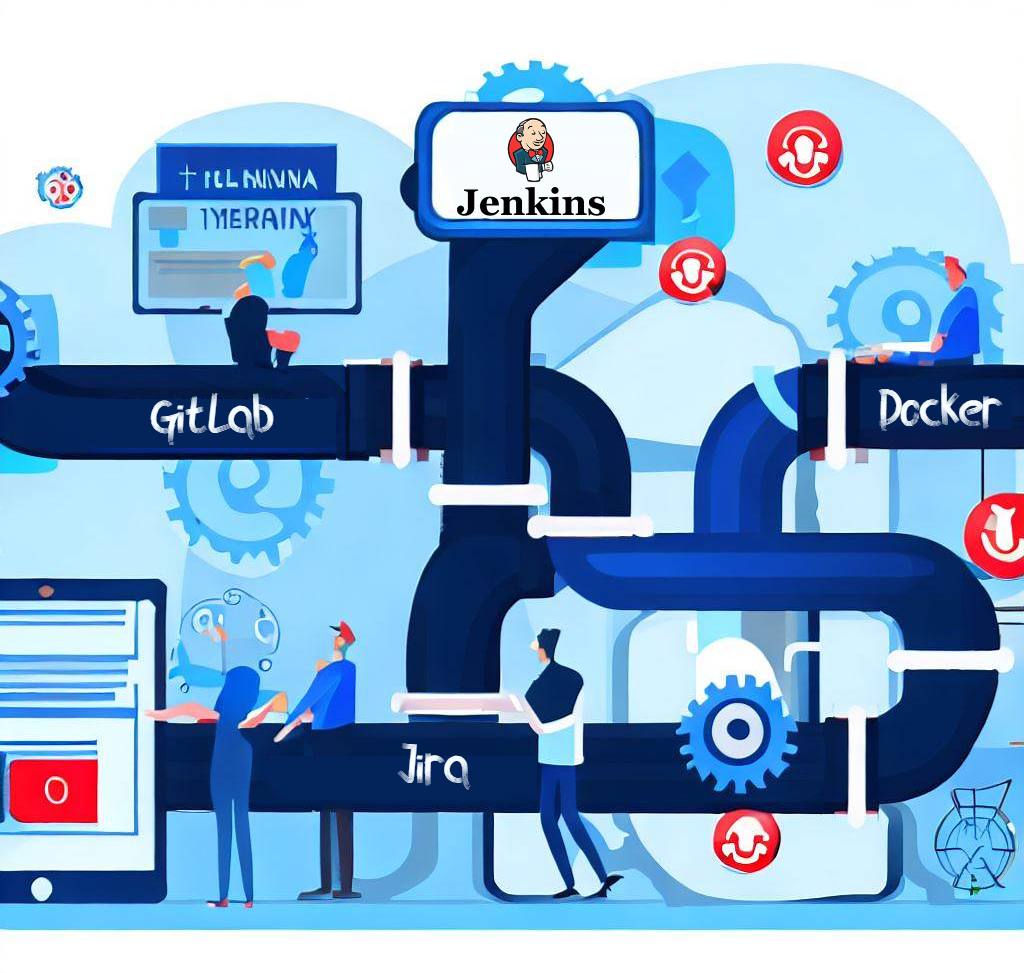As software development becomes more complex and distributed, it's critical to have a reliable and efficient software development pipeline. Jenkins is a powerful tool for continuous integration and delivery, but it's even more powerful when integrated with other tools in your software development pipeline, such as GitHub, Jira, and Docker.
This post will guide you through the process of integrating Jenkins with GitHub, Jira, and Docker, and demonstrate how this integration can help you streamline your software development pipeline. Additionally, we will recommend that you speak with DevPals experts to help you get the most out of this powerful toolset.
Integrating Jenkins with GitHub
GitHub is a popular code repository that is used by millions of developers worldwide. Jenkins can be integrated with GitHub to automate the build and deployment process for software projects.To integrate Jenkins with GitHub, you will need to set up a webhook in your GitHub repository. This webhook will notify Jenkins when code changes are made to the repository, triggering a build.
Here's how to set up a webhook in GitHub:
- In your GitHub repository, navigate to Settings > Webhooks > Add webhook.
- In the Payload URL field, enter the URL of your Jenkins server. This URL should include the "/github-webhook/" path.
- Select "application/json" as the Content type.In the "Which events would you like to trigger this webhook?" section, select "Just the push event".
- Click "Add webhook" to save your changes.
- In your GitHub repository, navigate to Settings > Webhooks > Add webhook.
- In the Payload URL field, enter the URL of your Jenkins server. This URL should include the "/github-webhook/" path.
- Select "application/json" as the Content type.In the "Which events would you like to trigger this webhook?" section, select "Just the push event".
- Click "Add webhook" to save your changes.
Once you have set up the webhook in GitHub, you will need to configure Jenkins to receive the webhook and trigger a build. This can be done using the "GitHub Webhook Trigger" plugin in Jenkins.Here's how to configure Jenkins to receive the webhook:
- Install the "GitHub Webhook Trigger" plugin in Jenkins.
- In your Jenkins job configuration, under the "Build Triggers" section, select "GitHub hook trigger for GITScm polling".
- Save your changes.
Now, when changes are made to your GitHub repository, Jenkins will automatically trigger a build.

Integrating Jenkins with Jira
Jira is a popular issue tracking tool that is used by many software development teams. Jenkins can be integrated with Jira to automate the build and deployment process for software projects and to track the status of issues in Jira.To integrate Jenkins with Jira, you will need to install the "Jira Trigger" plugin in Jenkins. This plugin allows you to configure Jenkins to trigger a build when a Jira issue is updated.Here's how to configure Jenkins to trigger a build when a Jira issue is updated:
- Install the "Jira Trigger" plugin in Jenkins.
- In your Jenkins job configuration, under the "Build Triggers" section, select "Jira Trigger".
- Configure the Jira Trigger to match the Jira issue that you want to trigger the build.
- Save your changes.
Now, when the Jira issue is updated, Jenkins will automatically trigger a build.Additionally, you can use the "Jira Deployment Plugin" in Jenkins to track the status of issues in Jira during the build and deployment process. This plugin allows you to update the status of issues in Jira based on the outcome of the build and deployment process.
Integrating Jenkins with Docker
Docker is a popular containerization platform that is used by many software development teams. Jenkins can be integrated with Docker to automate the build and deployment process for software projects and to manage Docker containers.To integrate Jenkins with Docker, you will need to install the "Docker Pipeline Plugin" in Jenkins. This plugin allows you to build Docker images, run Docker containers, and manage Docker registries in your Jenkins pipelines.
Here's how to integrate Jenkins with Docker:
- Install the "Docker Pipeline Plugin" in Jenkins.
- Create a Dockerfile that defines the Docker image that you want to build. This Dockerfile should be added to your code repository.
- In your Jenkins pipeline, use the "docker.build" command to build the Docker image.
- Use the "docker.image" command to run a Docker container using the newly built Docker image.Use the "docker.withRegistry" command to push the Docker image to a Docker registry.
By integrating Jenkins with Docker, you can automate the process of building and deploying Docker containers, making it faster and more efficient.
Recommendations
Integrating Jenkins with other tools in your software development pipeline can help you streamline your development process and improve your overall productivity. However, setting up and configuring these integrations can be a complex and time-consuming process.That's why we recommend speaking with DevPals experts. Our team of experienced software developers can help you set up and configure your Jenkins integrations, as well as provide best practices and recommendations for optimizing your software development pipeline.In addition, our team can provide support and troubleshooting services to ensure that your software development pipeline runs smoothly and efficiently.
Conclusion
Integrating Jenkins with other tools in your software development pipeline, such as GitHub, Jira, and Docker, can help you streamline your development process and improve your overall productivity. By automating the build and deployment process, tracking the status of issues in Jira, and managing Docker containers, you can focus on developing high-quality software and delivering value to your customers.
We hope this guide has been helpful in demonstrating how to integrate Jenkins with other tools in your software development pipeline. Remember to reach out to DevPals experts for help and support in optimizing your software development pipeline.
